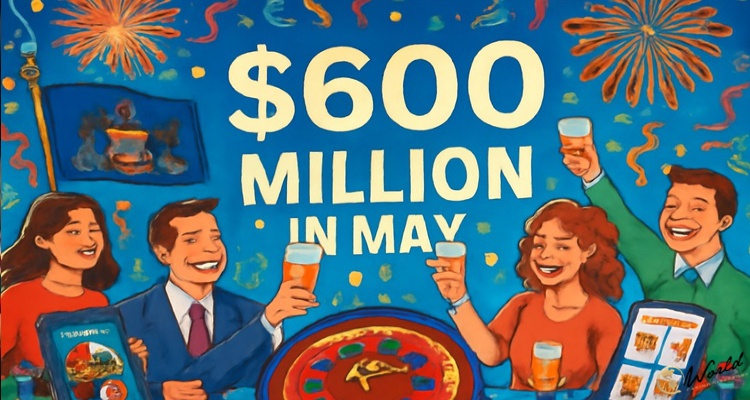In May 2025, Pennsylvania’s gaming industry achieved a historic milestone, surpassing $600 million in total revenue for the first time ever. According to the Pennsylvania Gaming Control Board (PGCB), the state’s gaming revenue hit a record $601,833,369, marking a 15.52% year-over-year increase from May 2024. This represents a notable rise of $80.8 million from the previous year. With this performance, Pennsylvania’s gaming revenue now ranks third nationally, following New Jersey and Nevada, which are projected to surpass $1.2 billion in May’s gross gaming revenue.
Growth across all gaming categories:
This record-breaking performance was bolstered by strong gains in several key areas of the gaming sector, with online casinos and sports betting leading the charge. The state’s casinos, both brick-and-mortar and online platforms, contributed heavily to this increase, with iGaming accounting for a significant portion of the revenue growth. The PGCB’s monthly report also highlighted the record tax revenue generated from gaming activities, totaling $255,136,529 in May 2025.
May’s revenue growth was driven by several gaming verticals, including both traditional and online platforms. Retail slots generated $224,873,947, a 5.02% increase compared to last year, while retail table games brought in $79,915,903, showing a slight decline of 4.55%. Online casinos, including iSlots and iGaming tables, saw the most impressive growth. Online slots generated $177,181,084, reflecting a 39.62% increase from May 2024. Similarly, iGaming tables rose by 17.83%, bringing in $52,921,848, and iGaming poker experienced a 20.92% boost, totaling $2,750,831.
The most notable increase came from sports betting, which continued to gain popularity in the state. Total sports wagering handle reached $655,358,227, representing a 10.72% increase over the same period in 2024. Sports betting revenue itself grew by 34.39%, totaling $59,417,240 in taxable revenue. Hollywood Casino at the Meadows and Valley Forge Casino Resort were the leading operators in sports wagering, with Valley Forge reporting a 24.30% increase in sports betting revenue year-over-year.
In contrast, video gaming terminals (VGTs) showed a minor decline in revenue, falling by just 0.08%. Total VGT revenue for May 2025 amounted to $3,683,566, slightly down from $3,686,448 in May 2024. Fantasy contests also experienced a decrease, with revenue dropping by 5.35%, totaling $1,088,950 compared to $1,150,472 last year.
Online casinos fuel record revenue:
The most striking growth came from the iGaming sector. Online gaming, which includes slots, tables, and poker, generated a total of $232,853,763 in May 2025. This is an increase of 33.76% from the previous year, driven by substantial gains in iSlot revenue and poker rake fees. Hollywood Casino at Penn National was the highest earner in iGaming, with total online casino revenue reaching $90,137,723, up 38.39% from 2024.
As Pennsylvania’s iGaming market continues to expand, the role of online platforms in the overall gaming economy has become increasingly significant. The growth in this sector is a clear indication of changing consumer preferences, with more players opting for online gaming experiences alongside traditional casino visits.
The record-breaking gaming revenue in May 2025 highlights the continued success of Pennsylvania’s gaming industry, which is a major contributor to the state’s economy. With casinos, iGaming platforms, and sports betting operations flourishing, the state saw significant job creation and tax revenue generation. In 2024, the gaming industry produced $2.66 billion in tax revenue and fees, demonstrating its importance as an economic engine.
Despite concerns about unregulated skill games—machines that operate under different legal classifications—the performance of the regulated gaming market in Pennsylvania remains strong. Skill games, which are expected to be legalized in the future, continue to face opposition from casinos, but the state’s success in regulating gaming activities has set a high benchmark for growth.


